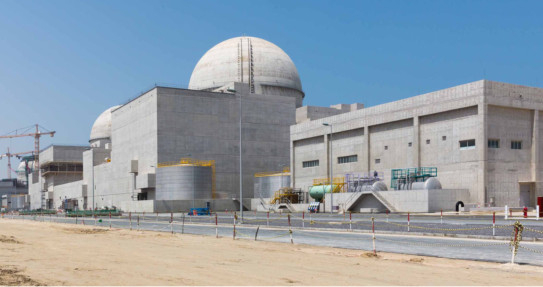
Abu Dhabi: In a major milestone for the UAE’s peaceful nuclear energy programme, the Federal Authority for Nuclear Energy (FANR) on Monday announced the approval for the operating license for Unit 1 reactor at the Barakah Nuclear Power Plant.
The approving license caps a 12-year journey since the UAE officially launched its nuclear programme back in 2008, with Unit 1 now set to enter into its commission phase according to FANR, before starting full commercial operations.
“A new achievement has been just made by the UAE, becoming the first Arab country to operate a peaceful nuclear power plant. The UAE today granted Nawah Energy Company the operating license for Unit 1 of the Barakah Nuclear Power Plant. Achievements are being doubled by the UAE people. I congratulate my brother Mohammad Bin Zayed on this historic feat,” tweeted out His Highness Shaikh Mohammad Bin Rashid Al Maktoum, Vice-President and Prime Minister of the UAE and Ruler of Dubai, hailing the announcement.
His Highness Shaikh Mohammad Bin Zayed Al Nahyan, Abu Dhabi Crown Prince and Deputy Supreme Commander of the UAE Armed Forces, also remarked about the feat on his Twitter page.
“Today marks a new chapter in our journey for the development of peaceful nuclear energy with the issuing of the operating license for the first Barakah plant. As we prepare for the next 50 years to safeguard our needs, our biggest strength is national talent,” tweeted out His Highness Shaikh Mohammad Bin Zayed Al Nahyan, Crown Prince of Abu Dhabi and Deputy Supreme Commander of the UAE’s Armed Forces.
To issue the approval for the 14,000-page operating license application, FANR conducted more than 185 inspections and requested 2,000 additional pieces of information related to the reactor’s design, safety and other issues related to regulatory requirements.
The license application for Unit 1 was submitted by the Emirates Nuclear Energy Corporation (ENEC) back in 2015 on behalf of its subsidiary Nawah, which will be the official operator of the site.
“We would like to officially announce the conclusion of our work to review the operating license application for Unit 1 after verifying the unit meets all of FANR’s operating license requirements at stated by UAE laws,” said Hamad Al Kaabi, UAE Permanent Representative to the International Atomic Energy Agency (IAEA), at a media press conference announcing the operating license.
“This is a historical moment for the UAE, making it the first Arab country in the region to operate a nuclear power plant culminating efforts of 12 years in building such a programme,” he added.
“Nawah, the operator, will undertake a period of commissioning to prepare for the commercial operation during which FANR will have around the clock inspection, using its resident inspectors at Barakah Nuclear Power Plant and deploying other inspectors,” he said.
Christopher Viktorsson, director general of FANR, said the commissioning phase would see Nawah begin the process of loading the fuel into the reactor.
“Nawah has all the legal instruments to start, but operations will not start overnight. They have to do tests, but first of all they have to load the fuel into the reactor, which will take some weeks.
“All the safety systems have to be tested as well, we at FANR have prescribed a lot of tests for them to carry out, and we will be there to supervise. I’m sure Nawah have their timeline, but we don’t regulate that and so they can take the time they need before they move to full commercial operation,” he added.
International transparency
Commenting on the nuclear programme’s international transparency, Al Kaabi highlighted how all international conventions and agreements were abided by throughout the entire process, with FANR also allowing several international inspections to the nuclear site.
“The UAE nuclear energy programme, including the nuclear law and regulations, conforms to the safety standards of the International Atomic Energy Agency (IAEA) and the international best practices.
“The UAE received in the past decade 11 major peer review missions from the IAEA to review and assess various aspects from nuclear infrastructure, the legal and regulatory system, nuclear safety… and nonproliferation,” he added.
“Such commitments ensure the programme is designed for peaceful purposes and in line with national and international laws,” he said.
Unit 1 reactor makes up the first of four reactors at the Barakah nuclear site, when completed, all four reactors will contribute to 25 per cent of the UAE’s electricity generation and will also reduce C02 emissions by 21 million tonnes annually.
Al Kaabi said that no timeline was currently available on when the operating license for Unit 2 would be made.
Timeline of the UAE’s nuclear energy programme
- 2008: UAE issued its nuclear policy in 2008
- 2009: Federal Authority for Nuclear Regulation and Emirates Nuclear Energy Corporation established
- 2010: ENEC submits construction license application for the country’s first nuclear power plant
- 2012: Construction license for Barakah Units 1 and 2 issued
- 2013: Construction license for Barakah Units 3 and 4 issued
- 2015: Operating license application for Units 1 and 2 submitted
- 2017: Operating license application for Units 3 and 4 submitted
- 2018: FANR certifies first and second groups of senior reactors operators
- 2020: FANR issues operating license for Unit 1
Project’s overall completion
- Unit 1 – completed
- Unit 2 – 95 per cent complete
- Unit 3 – 92 per cent complete
- Unit 4 – 83 per cent complete
What next?
With the operating license now official for Unit 1, the reactor will start its commission period, with the operator slowly ramping up operations to full capacity at the reactor. The operator – Nawah – will now be allowed to load Unit 1 with nuclear fuel, which will power the reactor. This process of loading the fuel will take a few weeks, and once carried out the operator will gradually increase the performance of the reactor to generate energy. When completed, Unit 1 will be able to generate 1,400 mega watt of electricity. The commission period could take several months until the reactor can start commercial operations.








